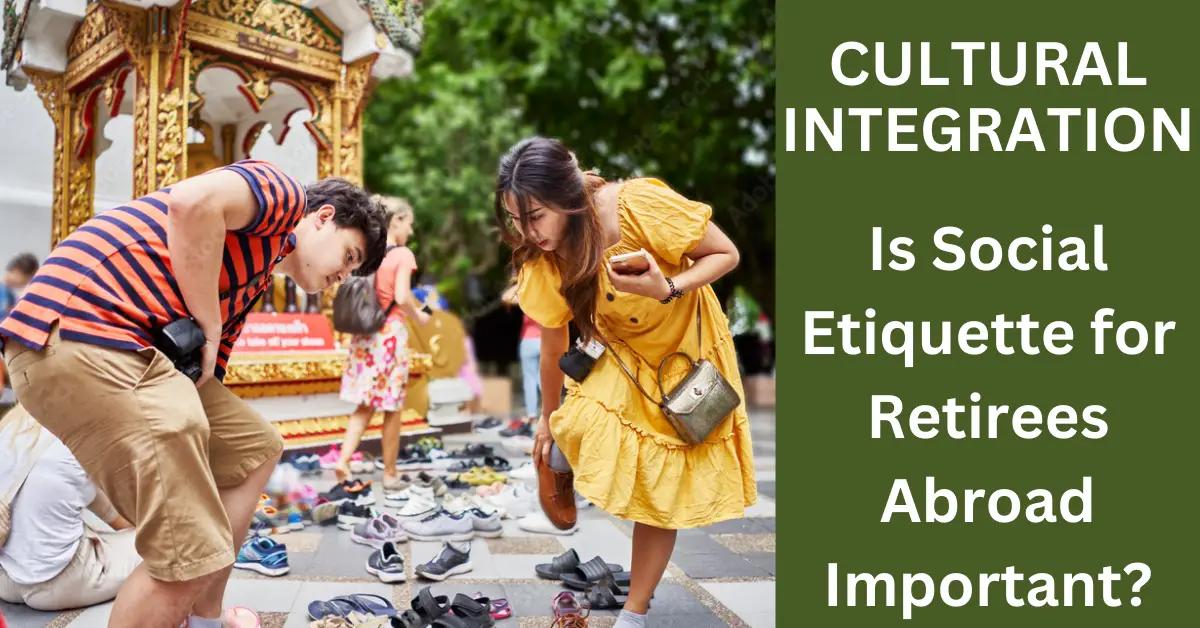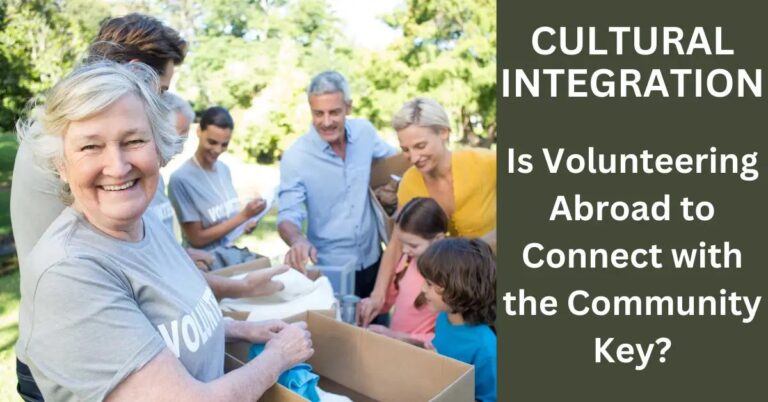TL;DR:
- Retiring abroad presents challenges, including cultural norms and language barriers.
- US retirees must check visa rules for each country to determine stay durations.
- Understanding local customs, like greetings and shoe removal, aids integration.
- Learning the local language enriches life abroad, with places like Mexico and Portugal being popular for English-speaking retirees.
- Participating in clubs and social groups enhances community integration.
- Respecting cultural etiquette and humor prevents awkward situations.
- Retirees must pay taxes even while living abroad; tax laws vary by country.
- Volunteering is vital for social integration, providing purpose and community connection, and should be tailored to retirees’ interests and skills.
Ever wondered why social etiquette matters when you retire abroad? As a global nomad, embracing the customs of your new home can make or break your experience. The cultural norms you adopt can help ease your transition and enrich your retired life. Let’s explore simple tips and insights to help retirees like you adapt to local traditions, navigate social customs, and build a fulfilling life overseas.
Is Social Etiquette for Retirees Abroad Important?
Retiring in a new country is exciting, but it comes with its own challenges. Every country has different traditions and customs, which might be new for you. This cultural awareness is key for retirees adapting to their new environment.
How long can a retired US citizen stay out of the country? Most US retirees can stay abroad for extended periods, but they must check visa rules. Each country has different rules for how long you can stay. It is best to learn about these rules early to avoid surprises.
Assessing the benefits and challenges before deciding to retire abroad is crucial. Living in another country can be cheaper and offer a better lifestyle. However, it might also mean facing language barriers and missing family. Should you spend your first year of retirement abroad? Spending your first year abroad can be eye-opening. It helps you decide if the place is right for you.
Understanding local cultural norms helps seniors integrate better into their new home. Some countries have strict customs like removing shoes indoors or greeting elders first. Failing to follow these might offend locals. Observing these norms shows you respect their culture, which might help you receive warm welcome.
Living with different customs can deeply affect daily activities for expatriates. Grocery shopping, dining out, and attending events might feel strange at first. Yet, observing these customs makes everyday interactions smoother.
Adapting to these customs involves knowing what to do and what to avoid. Embrace practices like greeting people with hugs or bows, depending on the culture. Avoid assuming everyone understands English or values the same things.
Choosing to spend your first year overseas encourages cultural adjustment. It allows retirees to explore local traditions and decide if the lifestyle suits them. After all, life abroad presents both challenges and pleasures, like exploring new foods and making new friends.
How Can Retirees Overcome Language Barriers Abroad?
Learning the local language where you retire transforms your overseas life. It enables not only everyday conversations but also builds deeper connections. You feel more at home in the community. Retirees can better enjoy local markets, understand cultural events, and socialize with neighbors.
Success with language starts with simple phrases. Greetings, thanks, and basic questions anchor everyday interactions. Many countries welcome American retirees, like Mexico and Portugal. For those balancing Social Security, Mexico stands out. It’s affordable and offers English-speaking communities.
Techniques for effective cross-cultural communication include patience and non-verbal cues. Use gestures and body language to enhance understanding. Keeping a positive mindset also helps. Social gatherings and local clubs are ideal places to practice. They provide chances to meet people and make friends.
Countries like Belize and Costa Rica offer easier language environments. Many locals speak English, easing transitions. This lessens the need for fluency from day one. It’s comforting to know you can navigate with less stress.
However, fully embracing the local language enriches retirement. It ensures smoother experiences and fosters meaningful interactions everywhere. Resources for language learning target seniors specifically. Online tools like Duolingo and language classes from local libraries or community centers are helpful.
Learning a language is rewarding but takes time. Retirees should aim for regular practice. Conversations with new friends can be more fun and engaging than textbook exercises. The effort spent on language not only opens doorways but deepens your retirement abroad.
In summary, thriving overseas means blending local language learning with community efforts. If handled well, language barriers transform into unique cultural bridges. These connections can define your new home, giving you a happier and richer retirement life.
Is Social Etiquette for Retirees Abroad Important?
Navigating social interactions abroad can be tricky, especially for retirees. Let’s face it, making friends in a new place can feel like a task. But it doesn’t have to be. You just need a few tools in your pocket to make this journey easier. One question retirees often ask is, “Which country did you choose to retire in, and are you happy with your choice?” This question is best answered by evaluating how well you can build a support network there.
Start by joining clubs or social groups. If you love gardening, look for a local club. Are you into art or writing? Find people who share your passion. Most communities welcome new faces, and these gatherings can become your new social circle. Visit local community centers and see what they offer. Remember, social interactions can indeed lead to wonderful friendships.
Participating in local activities also helps you blend into your new community. Whether it’s a weekly farmers’ market or a little league game, showing up matters. Say hi and smile. Ask questions about their culture and share stories about yours. It creates a meaningful exchange and helps break barriers.
Speaking of cross-cultural friendships, they can truly enrich your life. Be open and curious—a friendly attitude wins hearts. Sometimes, differences seem large, but shared interests often bridge these gaps. You may explore group outings or local tours to experience the culture on a deeper level.
Creating inclusive social environments is vital. Seniors often worry about feeling excluded, but in a friendly community, everyone has a place. Inclusive activities open doors for friendships with a mix of age groups.
Remember, making friends overseas is not just about finding other expats. It’s about social integration and enjoying local life. Look into classes or workshops that can open more ways to connect. You’ll find that understanding different cultures and making local friends isn’t just fun—it transforms your retirement into an adventure.
Is Social Etiquette for Retirees Abroad Important?
Respecting traditions abroad is like having a map in a new land. One of the trickiest parts of living in a foreign country is understanding its customs. Many retirees find joy in discovering new cultures. But stepping on cultural faux pas can make adapting difficult. For instance, a thumbs-up sign is friendly in the USA. Yet, in some countries, it’s rude. Knowing these small differences can save you from awkward moments.
Communicating with locals involves more than just words. Humor and jokes vary greatly across cultures. What you laugh at might confuse others abroad. Learning local humor can make interactions smoother. This helps in making friends and settling into your new environment. It’s fun to share a laugh and can be the bridge to new friendships.
That’s not all. Retirees abroad must also consider legal and financial etiquette. A key question often arises: Do retirees pay taxes if they live abroad? Most retirees do pay taxes, even if they live outside the U.S. Each country has its own tax laws. Knowing these rules is essential for a hassle-free retirement. It’s important to check specific agreements between countries, like tax treaties. This understanding aids in a more comfortable living experience.
Living abroad involves adapting to local customs. Practical tips for respecting traditions include observing and asking locals about do’s and don’ts. When unsure, a kind question can reveal much about the correct behavior. Purchasing guidebooks or attending cultural workshops adds to your knowledge. This conscious effort shows respect, earning goodwill from local communities.
Understanding these factors not only avoids faux pas but enriches your life abroad. With these insights, your overseas retirement will be more fulfilling and enjoyable. Respect and knowledge lead to rewarding experiences, bringing you closer to the community. Pursuing these aspects can make expatriation memorable and satisfying.
Is Social Etiquette for Retirees Abroad Important?
Volunteerism enriches life and creates a sense of belonging for retirees abroad. By volunteering, you can find purpose, meet local friends, and learn new skills. It also helps you better understand expat challenges.
You might ask, “How long can a retired US citizen stay out of the country?” The answer is they can stay as long as they want; however, they must meet certain requirements to maintain residency or benefits.
Many volunteer opportunities exist for expats to explore. Libraries can seek help with events, schools need English teachers, and wildlife shelters often appreciate caregivers. Senior volunteer projects abroad benefit from your experience, letting you contribute wisely to society.
Through volunteering, retirees can engage with and give back to their communities. You become a vital part of special projects in local areas. These projects offer a way to connect meaningfully with residents. Your work even helps bridge cultural divides and create a richer life abroad.
Working as a volunteer is also a way to overcome personal expat challenges. Adapting to a new culture may be tough. But, by contributing time and effort, one can gain a stronger sense of purpose. This leads to increased happiness and fulfillment in a foreign environment. Volunteering allows you to learn and grow while dealing with new situations and people.
Senior volunteer projects abroad tailor to your needs. They often come with flexible hours, so they fit your lifestyle. Opportunities can include reading to children, gardening, or helping with community events. Each project highlights different skills, encouraging contribution in diverse ways.
By carefully selecting your volunteer opportunities, you can shape a wonderful expat experience. You build a new life abroad, filled with learning and meaningful moments.
Conclusion
Retiring abroad opens up a world of new experiences and cultural adventures. From adapting to local customs and learning new languages to navigating social interactions and honoring traditions, each step enriches your life. Consider the stay limits and decide if spending retirement overseas suits you. Engaging in volunteer work can offer meaningful connections and a sense of purpose. With each interaction, you’re not just a retiree; you become part of a vibrant, diverse community. Embrace these opportunities and make the most of your new chapter abroad.












